1. Overview of the research project
The University of Tsukuba, in collaboration with the Japanese Association for the Study of Extracurricular Activities and PADECO Co., Ltd., conducted a “Study on internationalization and quality assurance of Tokkatsu (extracurricular activities ) aimed at fostering non-cognitive skills: Verification of the benefits of Tokkatsu in Egypt, a frontrunner in Japanese-style education” as an EDU-Port Japan 2023 research project. In this project, we investigated the status of localization of Tokkatsu introduced and conducted in Egypt, and qualitatively assessed its impact on non-cognitive skills, said to be an element that supports individual and social well-being. In addition, in collaboration with Egyptian educators, we aimed to develop a Japanese-style education model based on international universality and ethics, through the creation of a quality assurance system.
In two field surveys conducted in December 2023 and December 2024, we visited Egypt-Japan Schools (EJS), public schools, the Cairo Japanese School (CJS), and other schools that have introduced Japanese-style education, and conducted participant observations of classroom activities as well as interviews with students, teachers, and Tokkatsu Officers (TOs) who are responsible for supervising Tokkatsu activities. Based on an analysis of the findings, we have given a total of 16 presentations at domestic and international academic conferences. For more details, please refer to the website below.
https://tokkatsu-eduport.education.tsukuba.ac.jp/
We will present an overview of our activities over the past two years along with future prospects, focusing on the content of the report session held on February 1, 2025, which was attended by 119 participants both in person and online. (The materials from the session can be viewed in Japanese on the EDU-Port Japan website under the Project Outputs Search page.)
https://www.eduport.mext.go.jp/result/20240306-9785/)
2. Key findings from the research project
(1) Verification of the effectiveness of non-cognitive skills development in primary schools
When we compared EJS classroom meetings observed in 2023 with classroom meeting videos from 2019, we found lower rates of teacher comments, suggesting a shift from “classroom meetings organized and decided by the teacher” to “classroom meetings organized and decided by the students.” It also became clear that students were making more interrelated comments, suggesting a shift from “classroom meetings where individual students assert their own opinions” to “classroom meetings where students listen carefully to others and speak in response to others’ opinions.”
Analysis of the speech records showed that in 2019, discussions tended to go back and forth, with occasional isolated remarks disconnected from the overall discussion. In contrast, by 2023, discussions had developed a more coherent and layered structure, tending toward carefully considering each proposal and choosing between different opinions. While the structure of classroom meetings changed dramatically over the five years, challenges remained in the process of narrowing down proposals and building consensus.
In a participatory evaluation workshop for EJS teachers, parents, and Tokkatsu Officers (TOs), the most significant changes attributed to Tokkatsu were identified as children’s increased ability to express themselves freely, value teamwork, and explore and solve problems. Participants also noted that the students had become more cooperative, more accepting of others and of differences, and had developed leadership skills and a sense of responsibility, which in turn had enhanced their self-esteem and confidence. Behind these changes were changes in the teachers, including a shift toward more student-focused lessons with more consideration for each student’s personality, and improved lessons and enhanced professional abilities through stronger bonds among colleagues.
-
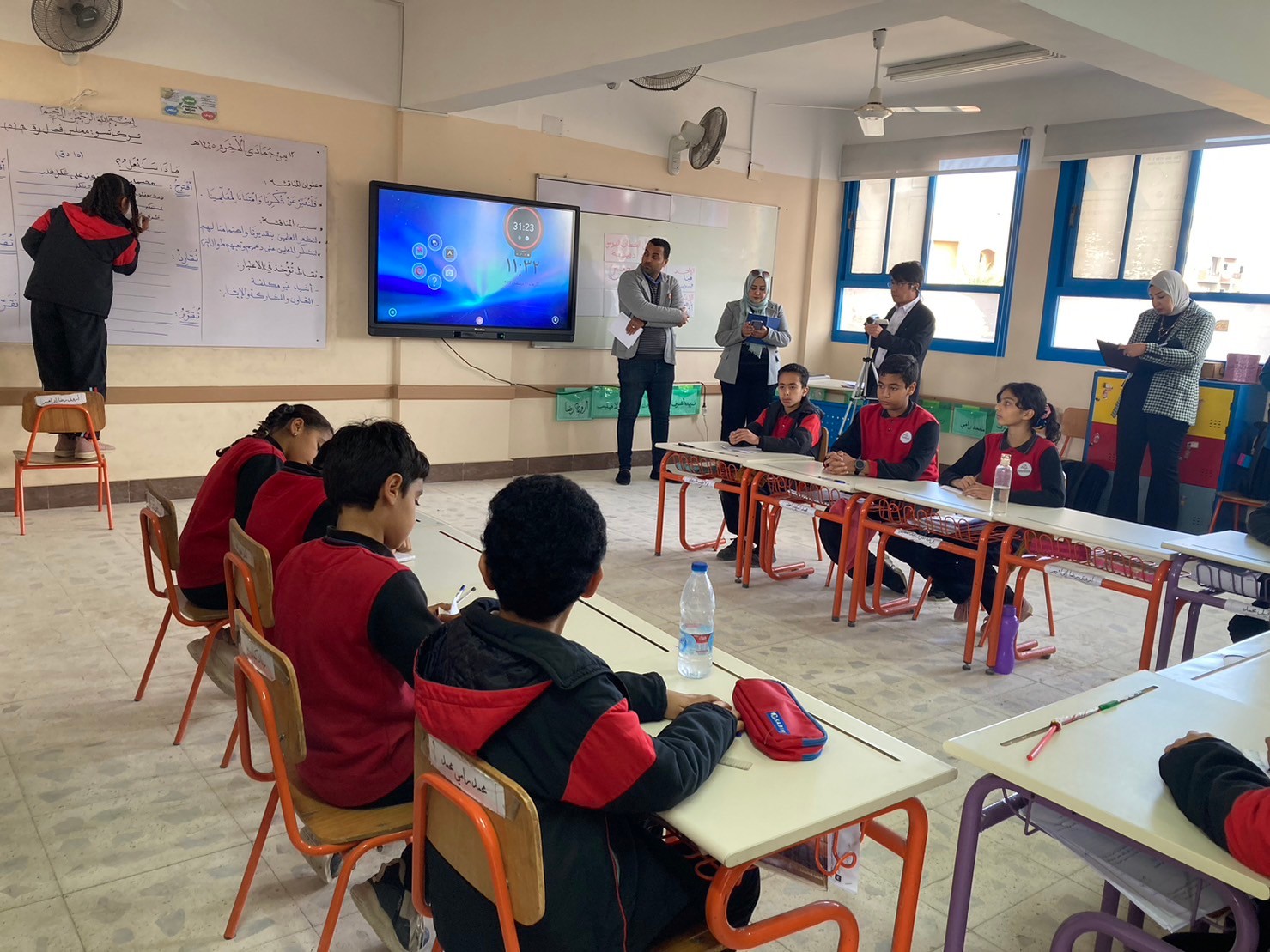 Participant observation of classroom meeting at EJS
Participant observation of classroom meeting at EJS -
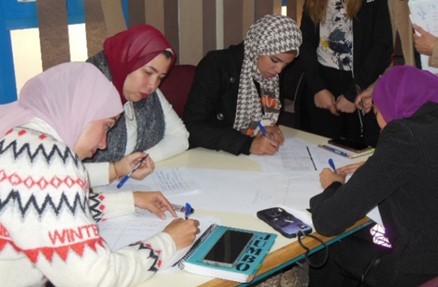 Participatory evaluation workshop at EJS
Participatory evaluation workshop at EJS
(2) Clarifying the process through which Tokkatsu was accepted and localized
Based on interviews, we identified the facilitating and inhibiting factors for the introduction and spread of Tokkatsu in Egypt as the receiving party (internal factors), and Japan as the initiating party (external factors). Regarding the introduction of Tokkatsu, both the internal and external facilitating factors outweighed the inhibiting factors, but the strength of the internal factors at national level (social factors in Egypt) was particularly noticeable. As for the spread of Tokkatsu, an examination of the educational and cultural dimensions showed that Tokkatsu, which has no religious basis, was interpreted as being close to education that embodies Islamic principles in real life, and was increasingly practiced. Although the teacher-led educational culture was an internal inhibiting factor for the spread of Tokkatsu, the “sense of change” that came from it acted as a facilitating factor. In other words, the values inherent in Egyptian culture, including education, could be said to have been manifested by the introduction of Tokkatsu. The acceptance and localization of a new educational model in a form that maintains consistency with the existing local culture may contribute to ensuring ethical integrity in overseas expansion of education.
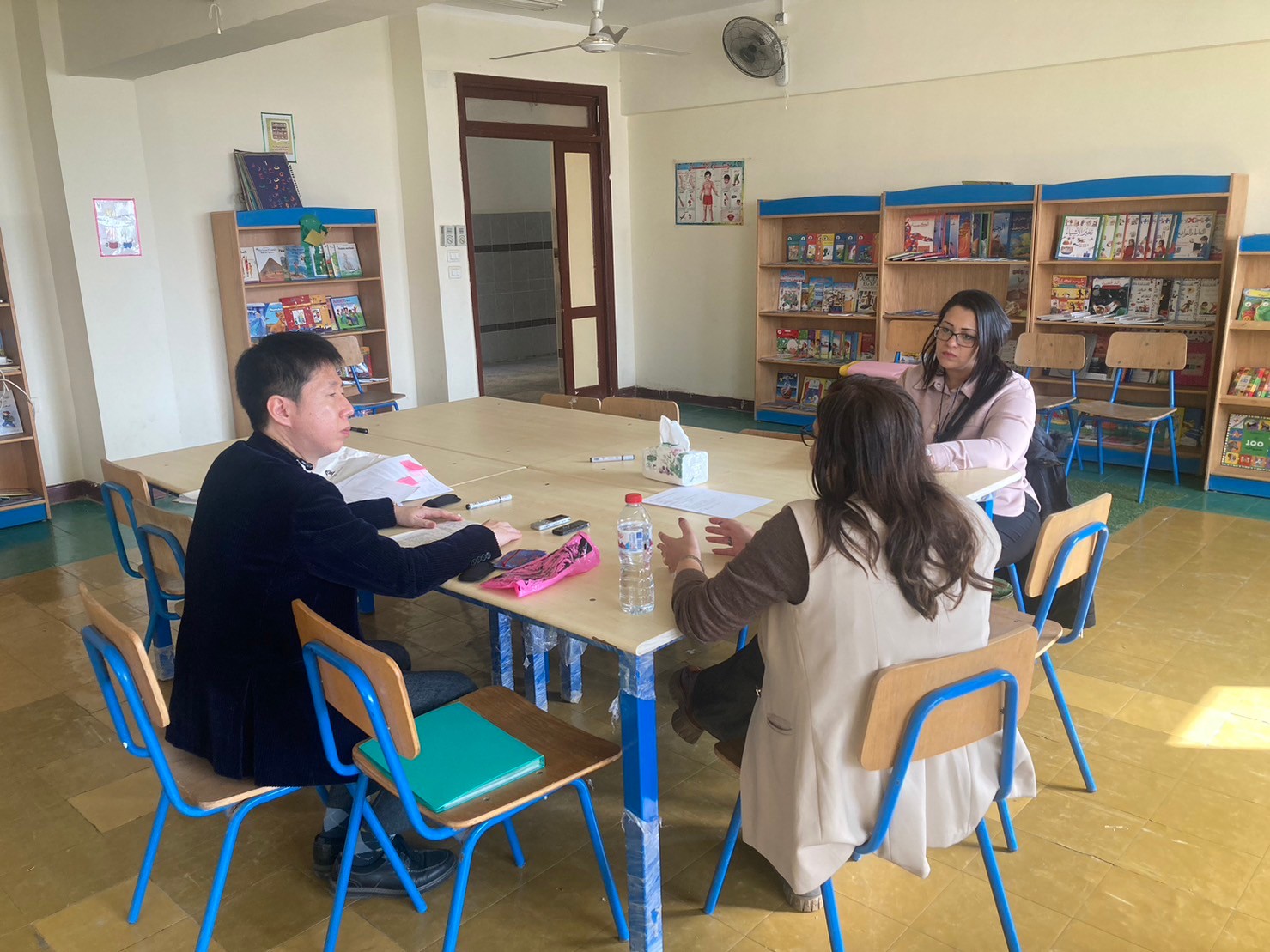
Interview with Tokkatsu Officers
(3) Joint development of a quality assurance system to strengthen sustainability
We held discussions with the Egyptian stakeholders regarding the establishment of a Tokkatsu diploma program and prepared an outline of the training course. The program was approved by the Education Faculty Committee of the Supreme Council for University, the Ministry of Higher Education of Egypt, and we are currently working toward implementing the program.
In collaboration with Egyptian researchers, we also worked on improving the Tokkatsu Training and Certification System (TTCS), which certifies outstanding Tokkatsu Officers (TOs). The evaluation criteria for the final interview examination tend to produce similar results regardless of who does the evaluation, making evaluation easy even for those with no experience in Tokkatsu, but one drawback is their inability to take a qualitative view. Future issues include how to enhance the quality of the evaluators and how to ensure incentives for acquiring the certification.
(4) Building a model framework for collaboration between Japanese and local schools
Through analysis of data from a joint mock classroom meeting conducted by teachers from Egypt-Japan Schools (EJS) and the Cairo Japanese School (CJS), as well as interview surveys, we examined approaches to collaboration between Japanese and local schools. Most Japanese schools abroad promote local understanding education as part of their mission. However, interaction between teachers is often limited to activities aimed at student interaction, without probing differences in the curricula or the unique aspects of learning in the host country. In this context, the interaction between EJS and CJS through lesson study focused on Tokkatsu as a shared curriculum presents new possibilities. Through such collaboration, it is essential to gain a deeper understanding of the host country’s curriculum, convey the merits of Japan’s curriculum, and reassess the significance of Japanese-style education.
-
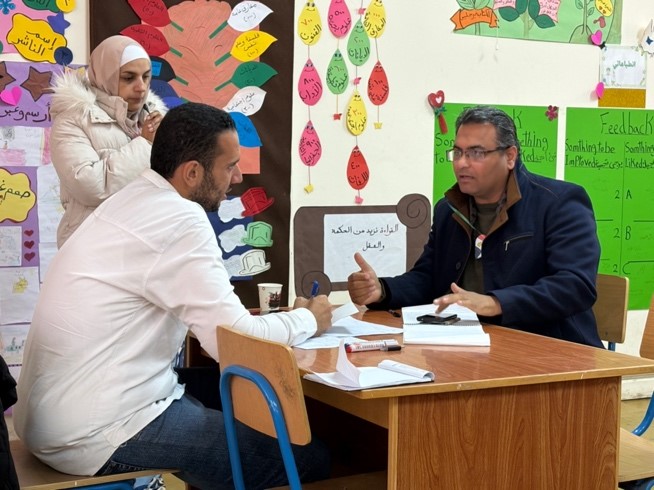 TTCS final examination (Feedback from TO to teacher)
TTCS final examination (Feedback from TO to teacher) -
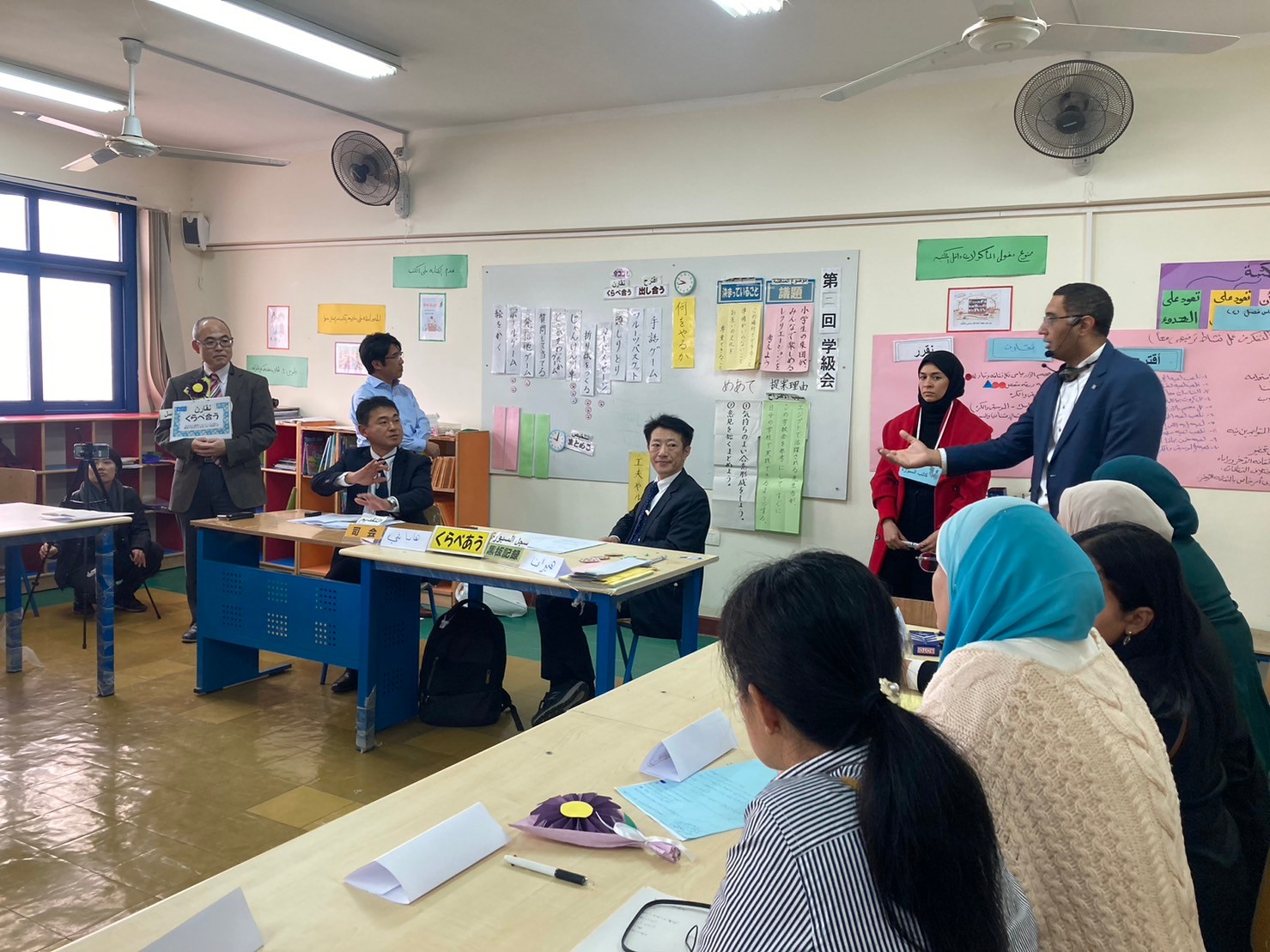 CJS and EJS joint mock classroom meeting
CJS and EJS joint mock classroom meeting
(5) Improving Japanese classroom meetings through lessons learned in Egypt
Leveraging the merits of Egyptian classroom meetings which draw on the free ideas of the students while persistently working toward consensus, we conducted a lesson study on classroom meetings in Japan. Specific measures included: (1) making the topic something the students want to discuss, rather than intentionally linking it to class management or class goals, (2) not writing down and reading out the reasons for the proposal in advance, and (3) conducting discussions aimed at achieving unanimous agreement. According to the questionnaire survey conducted after the lesson, 76% of the students felt that the classroom meeting was different from previous ones, 72% thought that reaching a decision by majority vote was not good, 96% preferred reaching a decision by unanimous agreement (consensus building), and 100% felt that classroom meetings have helped the class become more developed.
3. Implications for Tokkatsu in Japan
In Egypt, we have always carried out activities while keeping in mind the purpose of Tokkatsu. In contrast, in Japan, where Tokkatsu (Tokubetsu katsudo) are commonplace, it seems that the purpose is often unclear or is confused with the means. Once again, we were reminded of the importance of being aware of the purpose ofTokkatsu, rather than just thinking about the activities themselves.
The project to improve classroom meetings provided tips for the further internationalization of Japanese-style education. For better or worse, there is no clear “framework” for discussions in classroom meetings in Egypt. While the flexible “framework” sometimes leads to confusion, students were seen to overcome the lack of “framework” themselves by making a sincere effort to explain their ideas to other students. From this, we recognized that the challenge for Japan is to expand the scope of students’ autonomous activities and appropriately narrow the scope of teacher guidance.
Furthermore, Egypt is ahead of Japan in terms of a quality assurance system forTokkatsu. In Japan, it is not uncommon for supervisors specifically in charge of Tokkatsunot to be assigned to board of education secretariats, and also there is significant variation in their guidance abilities. It is therefore necessary to enhance the expertise of supervisors who support schools through training and other initiatives.
4. Outlook for future activities
Through this project, we have come to believe that connecting countries that have introduced Tokkatsu and fostering mutual learning will contribute to the further internationalization of Japanese-style education. Going forward, we aim to create an international network involving not only Egypt but also other countries, where practitioners and researchers involved in Tokkatsu can learn from one another. In addition, we hope to leverage this network to explore the development of teacher training and development programs, along with a system for their sustained evaluation and improvement, from both a local and a global perspective.







